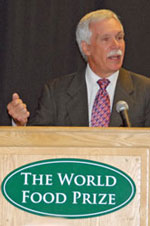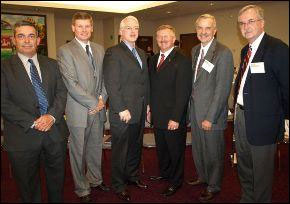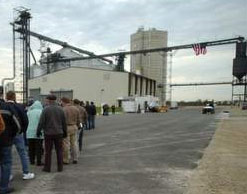 The City of Birmingham, Alabama will test a transit bus that will run on hydrogen next year.
The City of Birmingham, Alabama will test a transit bus that will run on hydrogen next year.
This story from the Birmingham (AL) News says it’s the work of a University of Alabama-Birmingham engineering team, along with Auburn University… among others:
“This testing in Birmingham gives us a chance to evaluate the fuel cell in a unique, real world setting,” said Fouad Fouad, UAB team leader and chair of the Department of Civil, Construction and Environmental Engineering.
“We want to monitor the bus’s performance in our brutally hot and humid summers and the fuel cell’s ability to power the bus over the city’s hills and terrain,” Fouad said. “Only after studying these elements can we decide whether the hydrogen fuel cell is a viable option.”
The bus will be operated and maintained by the Birmingham Jefferson County Transit Authority. It will be compared to regular diesel and natural gas buses in the fleet.
The project is funded through a congressional earmark from U.S. Sen. Richard Shelby to research alternative fuels and hydrogen as an energy source.
The article goes on to say that the first phase of the test will use to small hydrogen fuel cells to run the bus, working up to a larger cell.


 Students from the University of Colorado are spreading the good news of biodiesel… and going mobile to do it.
Students from the University of Colorado are spreading the good news of biodiesel… and going mobile to do it. The project West is referring to is a self-contained biodiesel trailer called ESTER, short for “fatty acid methylester,” or scientific name for biodiesel…
The project West is referring to is a self-contained biodiesel trailer called ESTER, short for “fatty acid methylester,” or scientific name for biodiesel…  Iowa State University has received an $885,000 U.S. Department of Energy grant to see how small particles can be used to help make biodiesel production bigger.
Iowa State University has received an $885,000 U.S. Department of Energy grant to see how small particles can be used to help make biodiesel production bigger.
 “We walked through the B&I loan guarantee program, which has been used by their memberships, and we assured them that this was a long-standing program that we would use to help finance businesses in rural America, some of them may be ethanol facilities,” Schafer said. “We assured them that no specific money was being set aside only for the ethanol industry.”
“We walked through the B&I loan guarantee program, which has been used by their memberships, and we assured them that this was a long-standing program that we would use to help finance businesses in rural America, some of them may be ethanol facilities,” Schafer said. “We assured them that no specific money was being set aside only for the ethanol industry.” Inspiration for the design came from the legendary Cooper Climax F1 car of the 50’s and is drawing on Britain’s vast Motor Sport Heritage while keeping a firm eye to the future. It is not a retro car, it is a modern Super Car designed with the discerning enthusiast in mind. It is revolutionary and has been designed to set a new standard in the niche vehicle sports car market. The Climax is bespoke and exclusive, quintessentially British, hand-finished, with excellent performance and superb handling.
Inspiration for the design came from the legendary Cooper Climax F1 car of the 50’s and is drawing on Britain’s vast Motor Sport Heritage while keeping a firm eye to the future. It is not a retro car, it is a modern Super Car designed with the discerning enthusiast in mind. It is revolutionary and has been designed to set a new standard in the niche vehicle sports car market. The Climax is bespoke and exclusive, quintessentially British, hand-finished, with excellent performance and superb handling.  Speakers included USDA Undersecretary Tom Dorr; editor Morton Sosland of Sosland Publishing Co.; and Randy Schnepf, agricultural economist with the Congressional Research Service.
Speakers included USDA Undersecretary Tom Dorr; editor Morton Sosland of Sosland Publishing Co.; and Randy Schnepf, agricultural economist with the Congressional Research Service. The world’s largest ethanol producer opened a third plant in Ohio on Friday.
The world’s largest ethanol producer opened a third plant in Ohio on Friday.  The
The 